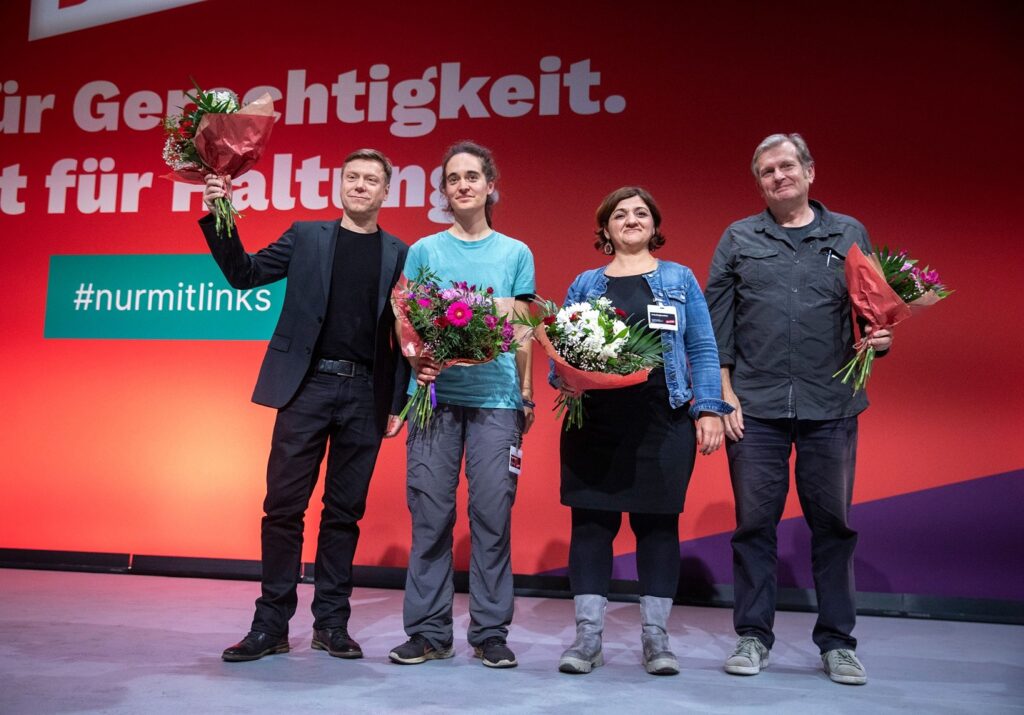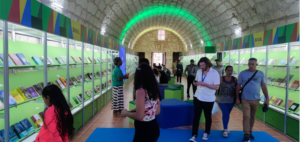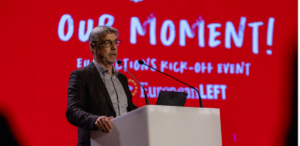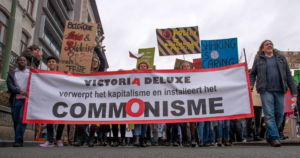Over 440 congress delegates travelled to the LINKE party congress in Augsburg to discuss and approve the electoral programme for the 9 June 2024 European Parliament elections. All the delegates then voted in the representatives assembly – which, as electoral law stipulates, had to take place separately – for the list of candidates running in the 2024 European elections for Die LINKE.
The key resolutions
As a result Die LINKE now has an electoral programme and people to campaign around it, including the four top candidates with Martin Schirdewan, Carola Rackete, Özlem Demirel, and Gerhard Trabert. Martin Schirdewan and Özlem Demirel stand for continuity with their previous work in the European Parliament, specifically for tax and financial policy in Europe and for a European social and peace policy in the struggle against militarisation. The former ship captain (of Große Fahrt and SeaWatch) stands for migrant and asylum-seekers rights and for a left, i.e. social-ecological, European agricultural policy. Gerhard Trabert will advocate for social rights in Europe – for the Social Progress Clause and the expansion of the European pillar of social rights, as well as for social legislation becoming primary law in the EU.
In separate votes all four were elected by a large majority. Although the ecologist Didim Aydurmus came in third and was not elected, she delivered an outstanding speech on European policy and received a respectable number of votes.
The elections for the other slots in the lists were decided on the basis of the impression made by the candidates at the congress, their support by various tendencies and/or federal state associations, and, unfortunately, only secondarily on the basis of competence in European policy. Therefore it is good that Ines Schwerdtner, with her focus on European was industrial policy, was elected to the fifth slot in the list.
Also passed was a motion on abolishing the debt brake and the introduction of a 1% wealth tax for net assets above one million Euros with a progressive rate for the super rich. This would give Germany’s federal states at least 60 billion Euros annually. Another demand was a one-off wealth tax, which can be stretched over 20 years and would yield more than 300 billion Euros.
Controversies and differences
As for points of discussion, there naturally were some, even without Sahra Wagenknecht who thankfully was in no way the ‘elephant in the room’. Some speakers were troubled by the expressions ‘new start’, ‘self-discovery’, and ‘future positioning’, which they associated with ideas of a fundamental new direction for the party. These voices, however, remained marginal. The majority of the speakers were interested in an objective discussion rather than an unproductive clash.
Of course, this congress – the first after Wagenknecht’s departure – could not address all problems, let alone solve them. Moreover, it was clear that the media would gleefully jump on any trace of a conflict – as the public television programme ZDF did in the case of an apparently unhinged person who presented himself as a candidate opposing Martin Schirdewan and in the end caused Martin to be elected with almost 87% of votes. Naturally, differences remain, all the more so that Die LINKE even without Wagenknecht still displays an impressive pluralism, which is especially on view when emotionally laden issues are discussed.
The biggest controversies emerged around the Palestine-Israel conflict in terms of how to evaluate Hamas’s terrorist attack and the murder of 1,200 people, children among them, and the taking of 200 people hostage, on the one side, and the evaluation of the bombardment of Gaza with its acceptance of the killing of ca. 12,000 people, among them children, on the other side. There was also discussion of the accusation of anti-Semitism. Nevertheless, it was possible to formulate a good and balanced position on Palestine-Israel. That this was possible even on this occasion was due to the intensive and integrative work of the party directorate throughout the whole congress and especially on this question. Die LINKE’s declaration on Palestine and Israel with the title: ‘Stop the War – Immediate Ceasefire! Free the Hostages! Prohibit anti-Semitism and racism!’ corresponds essentially to the declaration of the Party of the European Left (EL) of which Die LINKE is a member.
The controversies regarding the European Parliament electoral programme were kept within manageable limits, with greater differences turning up, as expected, in the chapter on peace (Chapter 4 of the Europawahlprogramm). The issue here was how to assess the international situation, the aggravation of global conflicts, and from this perspective the role of the BRICS states as well as the role of NATO and the autonomy of the European Union. In most cases the reworked sentences of the programme draft were retained while including numerous suggestions that clarified the basic text.
In connection with the war in Ukraine the question of sanctions was also debated. On this there were a number of motions for emendations, which were, by decision of the majority of delegates, not taken up because the original text presented was supported by a majority of delegates. But there was one exception: how to deal with nuclear technology. Here any ‘cooperation’ with Russia is to be sanctioned in the future.
Any differences beyond this were secondary. Many motions were intended to complete or clarify the original text through critical and expert support in the area of European policy, which was unfortunately too little appreciated.
The (feminist) renewal of Die LINKE
Repeatedly – and above all in Janine Wissler’s address – there were calls for a self-critical approach to one another and the renewal of the party. In dealing with sexism and gender-specific violence, guidelines were established which, on the one hand, would point up the social causes of violence against women, but above all would govern the practical procedures and concrete responsibilities in the case of sexism or violence also perpetrated by members of the LINKE, as well as the support for those affected, and the assumption of responsibility by the person carrying out the violence, as well as collective responsibility for the development of preventative measures.
New members – among them a nurse, a trade-unionist, and a campaigner and co-founder of Sea Bridge, who had herself just joined the party – launched a new initiative at the party congress to attract new members. With the motto ‘a left for everyone’ the idea is to finally put an end to the playing off of the precarised, refugees, and trade-union members from large-scale industries or the retail chains against each other. That this is possible has by now been shown by a communication on the website of the party: ‘thanks to our more than 1,000 new members !’
The party in the international left context
International guests were also present, among them Nadjet Hamdi (of Frente Polisario, in West Sahara), Alice Bernard (Parti du Travail de Belgique), Waltraut Fritz (EL/Austrian Communist Party) Malalai Joya (Afghanistan), Giorgios Chondros (Syriza), Jakob Sølvhøj (RGA, Denmark), Alain Rouy (French Communist Party), Jon S. Rodríguez Forrest (Izquierda Unida, Spain), and Aimar Etxeberria Kort (EH BILDU, Basque region). Walter Baier, the chair of the European Left, was of course there as well and delivered a remarkable greeting in which he pointed to the current possibilities and limitations of Europe’s left and argued, on the basis of a well-founded analysis, that a strong left – in Germany as well – is needed in Europe. He also outlined the future prospects of a left that is truly able to intervene in Europe – even if left parties in Europe act together in a constructive and sober way, and with their heart, the left is plural, with diverse strategies and diverging paths. Nevertheless, it is possible to use these differences for a common struggle for peace, social justice, and a just socio-ecological reconstruction in Europe and worldwide. And, considering the swing to the right, it is also necessary.
What else is there to report? There was a market of possibilities, that is, the area in which substructures of the party or other initiatives could see themselves, such as the Ecological Platform, Cuba sí, the Basic Income Working Group, and the Left Christians Working Group. Beyond these, the LINKE-related Rosa-Luxemburg-Stiftung, the Left Group of European Parliament deputies, the EL, and transform! europe were also present – the latter with its 2022 and 2023 yearbooks. And, naturally, Neues Deutschland (ND) was also there, along with the Kleine Buchladen bookstore and the LINKE-shop with merchandising.
For a strong left in Europe there needs to be a strong left in Germany
The mood was good – despite the many votes around the European Election Programme into the late evening hours. Everyone knew that a lot was at stake here – the survival of Die LINKE and a possible first breakthrough. The speeches were passionate, good, and above all heartening. Die LINKE has so many good people – this was clearly visible and audible. And so this first good kickoff was successful. Thanks are due to those who took care of the proceedings – on the stage and, even more so, off-stage – above all to the staff of the Karl-Liebknecht-Haus and the local volunteers. Well done, people! We’ll pull it off! As Walter Baier also stressed in his encouraging speech. So let’s get going – we have the stuff and the people to do it!
And: Let’s use this start-up moment for our Berlin electoral campaign, for the repeat of the federal elections in the state of Berlin on 11 February 2024, when what is at stake, among other things, is the defence of our directly elected parliamentarians[1] in the wards where we are strong, and which will decide whether Die LINKE will remain as a full parliamentary group in the Bundestag until the 2025 elections! Because we need a strong LINKE in Germany and Europe. In the context of the ongoing weakness of the Social Democrats and Greens in Germany, the pronouncements of conservatives and liberals that they will cut citizens’ income, point clearly in the direction of new social cuts with effects beyond Germany’s borders.
For good living conditions in all states of the European Union we need a solidary, strong, and united LINKE. With the motto #EineLinkeFürAlle in the party congress the first campaign for the renewal of Die LINKE was presented, a renewal which is just beginning and needs to be intensified, and which is also necessary for a strong 2024 electoral campaign for a social, democratic, ecologically sustainable, and, above all, peaceful Europe.
[1] Ed. Note: In Germany every citizen hast two votes, one for the general party list and one for specific popular candidates (Direktmandaten) presented outside of the list. If a party fails to reach the 5% mark it can still form a group in the Bundestag if it has three Direktmandaten.



